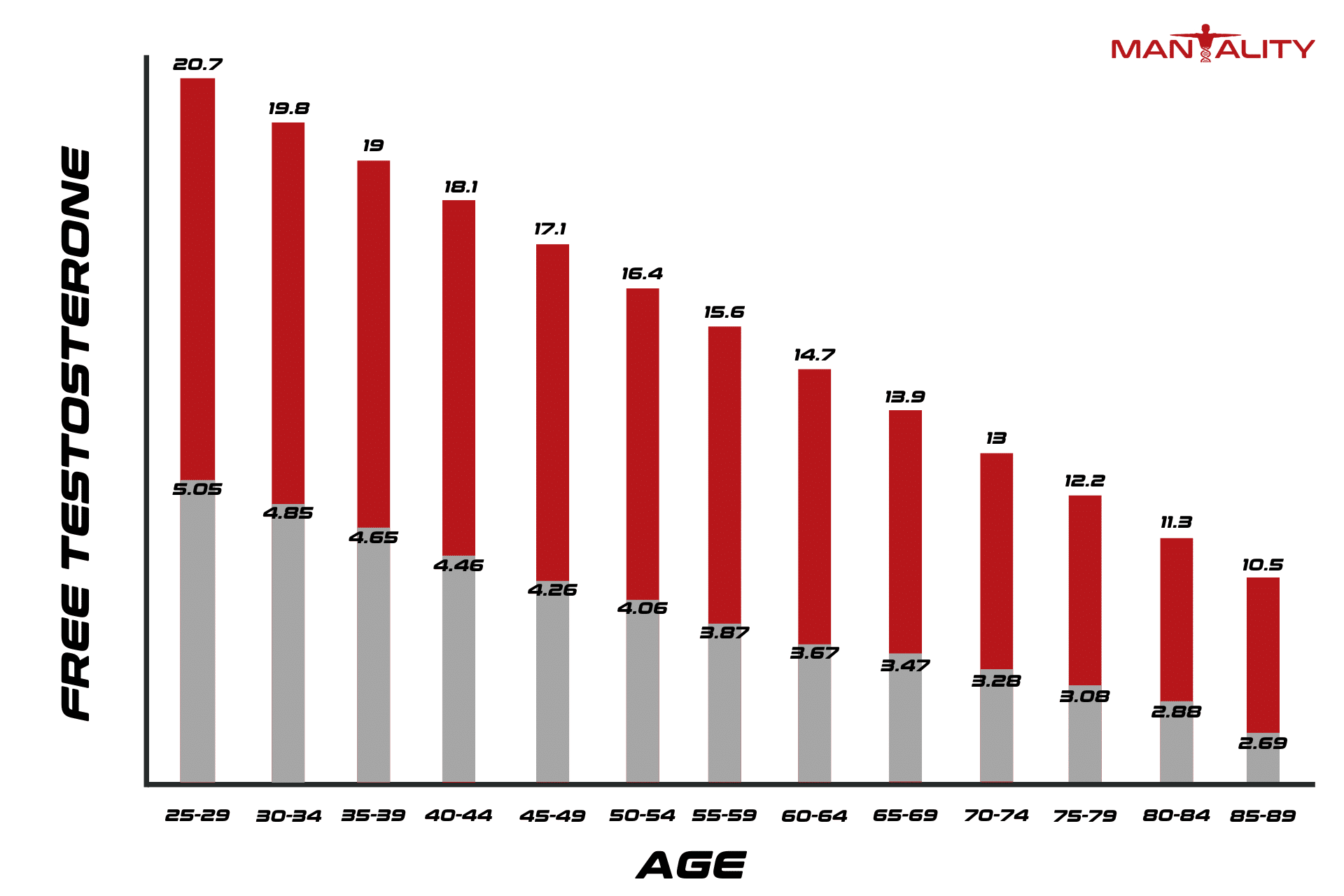Did you know high levels of stress can actually block your body’s response to testosterone? It gets worse: significant increases in stress produce a hormone called cortisol, who lowers your testosterone levels dramatically.
Here’s what we know for sure: according to researchers, there’s an extremely unhealthy link between high levels of cortisol and testosterone. Want to learn more? Read on to find out about the highs and lows of cortisol and testosterone!
Stress and Testosterone
So, what’s the relationship between stress and testosterone? First of all, stress is defined as a result of a mental or physical stressor that puts your body into extreme coping mode. And if you’re an athlete, even overtraining your body can be considered as a stressor.
That being said, there’s a huge difference between minor stressors and major stressors. As a matter of fact, some chronic stressors can last for years and years. In the past, minor stressors were seen as something that was much easier to deal with than chronic stress.
Sadly, people have chronic stress can also suffer from illnesses like reduced immune system functioning. And recently, today’s scientists’ have found that your body’s response to stress is just as strong for both minor and major stressors. Surprisingly, even smaller, more frequent stressors hurt your body.
Despite the fact that everyone’s body responds differently to stress, here’s what we can say for sure. Over time, your body builds up a so-called “adaptive response.” What happens next is crazy. Your body gets more and more used to stress over time.
On top of that, temporary periods of stress can lead to a huge emotional buildup over time. The result is that your body can become impacted by several stress-related diseases. In addition, intense feelings of stress that last for a long time will eventually turn off non-essential parts of your body that are connected to your growth.
As if that’s not enough, stress can lead to:
- Hypertension
- Diabetes
- Atherosclerosis
Can stress cause low testosterone? That’s where your cortisol levels kick in, becoming dangerously elevated as your body undergoes more stress.
Unfortunately, this can impact your testosterone levels as well, reducing your body’s ability to manage emotions, maintain body weight, and build muscles. Nobody wants that!
Why High Cortisol Levels Are a Major Risk
Let’s get real: as a natural stress hormone, high cortisol levels can really mess up your body’s response to testosterone. How do we know this? According to researchers at the University of Texas at Austin, ramping up your stress levels can reduce testosterone’s impact on domination and competition.
Published in the scientific journal Hormones and Behavior, scientists found that when your cortisol levels spike, your body is triggered into flight mode. While that may not sound bad, that means that your body’s ignoring your testosterone’s influencing and acting on pure cortisol fueled adrenaline.
Are you scratching your head? Don’t worry, you’re not alone. Here’s what you really need to know: when you’re in a 9-1-1 situation, your body’s response to testosterone is blocked. That’s because testosterone-related actions like aggression, competition, and mating aren’t exactly necessary at that time.
However, cortisol does encourage your body to go into survival mode, which can get you out of a tricky situation. But too much cortisol can actually be super bad for your body. As a matter of fact, increased cortisol levels can result in ailments like:
- Gaining weight, particularly around your upper back and your midsection
- Gaining weight around your facial area, softening your jawline in the process
- Breakouts of hormonal acne, which can impact your confidence levels
- Thinning skin, which shows more wrinkles on your face as you age
But wait – there’s more. Other side effects of heightened cortisol levels include:
- Permanently flushed face, so it appears that you’re always blushing
- Muscle weakness, which could also be related to lowered testosterone levels
- Extreme exhaustion throughout the day, which could also be called chronic fatigue.
- Bruising easily, which can slow down your healing process as you grow older
Symptoms and Causes of High Cortisol Levels
What are the real symptoms or causes high cortisol levels? Luckily, we’re here to help. Basically, increased levels of this stress hormone lead to symptoms like:
- Additional deposits of fat in between your shoulder blades, around your face, and on your midsection
- Long, purple stretch marks that can wrap around the sides of your midsection
- Sudden, inexplicable weight gain that isn’t based on dietary changes
- Injuries that just don’t heal as quickly as they used to.
So, what’s the true cause of high cortisol levels? Let us explain. Certain side effects from particular medications can lead to a massive spike in your body’s cortisol levels.
For instance, specific medications for arthritis and asthma can result in higher cortisol levels as well. Don’t want this to happen to you? All that you have to do is make sure that you’re following the proper dosage on your prescription bottle.
In case you’re taking steroid medications, you should definitely consult a physician before you go cold turkey. That’s because quitting this type of medicine abruptly can make your cortisol drop, leading to comas, low blood sugar, and reduced blood pressure. We highly recommend that you talk to your doctor before making any changes to your steroid medication dosage.
On top of stress, issues with your pituitary gland can also be responsible for high cortisol levels. For those who aren’t sure, the pituitary gland is a small organ at the base of the brain that can control your body’s production of hormones. Still with us?
It’s really not as complicated as it sounds. Here’s the breakdown. When you have problems with your pituitary gland, it can force your adrenal gland to produce more cortisol. And nobody wants that to happen?
But how can you prevent high cortisol levels as you age?
How You Can Prevent High Cortisol Levels
Not sure how you can prevent high cortisol levels? If you’re a first responder, military member, or a manual laborer, then it can be pretty hard to change up your stressful job. However, that doesn’t mean that you can’t protect your health.
First things first, you should know that low testosterone levels can lead to a host of health issues. But there are some measures that you can take to reclaim your health. For starters, you can always get a simple medical screening and physical to get an overall health assessment.
Are you someone that’s afraid of needles? Don’t worry, all it takes is a harmless blood draw to get the information you need. After that, you can take a look at your cholesterol, vitamin D, and magnesium levels too. Here’s the thing: if you love to work out on the gym, chances are that you’re losing a lot of magnesium from sweating profusely.
For those that improve their magnesium levels, you should expect to see a natural boost in testosterone levels and a decrease in body inflammation. Plus, your heart will feel stronger and your stress should drop too. Of course, getting a full night’s rest is another way to increase your health.
What about vitamin D? Unfortunately, it’s extremely easy to get a vitamin D deficiency, especially if you spend a lot of time indoors or work at night. That’s because vitamin D deficiencies happen when you don’t get outside enough.
And then, there’s zinc. What makes zinc so essential is that it helps to protect your heart and lower your inflammation. It also helps your muscle tissue repair and heals quickly. In addition, zinc can help your muscles grow stronger too.
Don’t know where to start? We highly recommend that you look into testosterone replacement therapy!
Additional Preventative Measures
Need additional preventative measures against high cortisol levels? Here are a few of our favorite cortisol-reducing remedies. To start, you should begin exercising as much as possible.
In addition to getting a full’s night sleep, you should get a sweat session in as regularly as possible. Naturally, this can greatly reduce your cortisol levels. Despite the fact that your cortisol levels spike right after a good exercise, they lower significantly once you go to sleep at night.
But here’s the catch: the more you train, the less your body responds to the whole cortisol reduction thing. So, make sure that you get your daily work out in, but don’t overwork yourself. Surprisingly, overtraining could backfire on you too.
Another great way to reduce your cortisol levels is to practice various relaxation techniques. Are you constantly feeling stressed? We highly recommend that you try a deep breathing exercise to reduce your tension.
Incredibly, this natural technique can lower cortisol levels significantly. In addition, there’s nothing wrong with checking out a yoga class eighter. These have been scientifically proven to lower stress and decrease cortisol levels.
Not a fan of yoga? You can practically get the same benefits from tai chi too. No matter what you do, make sure that relaxation is your main priority!
When It’s Time to See a Doctor
Curious about when it’s time to see a doctor? It’s simple: if you think you have elevated cortisol levels, then you should see a doctor and get a blood test immediately. Since high cortisol levels can lead to tons of other diseases, you’ve got to find out what’s at the root of the matter.
For those that are preparing to visit the doctor’s office, they might perform the following tests:
- Cortisol blood and urine exams
- Cortisol saliva exams
- Imaging exams
When it comes to cortisol blood and urine exams, your doctor will typically measure your cortisol levels through these bodily fluids. To begin, your doctor will take a small blood sample from your veins. Also known as a 24-hours urinary free cortisol excretion test, your doctor will examine your urine over a one day-long period.
Why does this matter? Because your physician will analyze your urine and blood samples in a laboratory to check your cortisol levels. The next step is a cortisol saliva exam.
This is done to see if you have Cushing syndrome, or elevated cortisol levels. At night, a sample of your saliva is collected to examine if you have high levels of cortisol in your body. Since cortisol rises and falls during the day, it significantly drops when people with normal cortisol levels go to sleep.
And then there are imaging exams. These magnetic resonance imaging tests can take photos of your adrenal gland and your pituitary gland to see if you have any abnormalities.
If left untreated, elevated levels of cortisol can lead to:
- Heart disease
- Diabetes and insulin resistance
- Mental health disorders
Are you struggling with a low testosterone stress disorder? If so, then it doesn’t hurt to reach out for help when you need it!
Cortisol and Testosterone = Dangerous Combo
What’s the bottom line? Cortisol and testosterone are a dangerous combination. When you’re dealing with testosterone and stress, cortisol can be a key factor in contributing to low testosterone levels in men.
And when your testosterone levels are low, your entire mood, bone structure, and physical well-being could be at stake. Don’t want to take any chances? It doesn’t hurt to visit a doctor to get your cortisol levels checked.
While you’re at it, practice some breathing exercises, yoga, and meditation to lower your cortisol at home. We promise you won’t regret it!
Need help with your wellness journey? Give us a call to schedule a free consultation!




